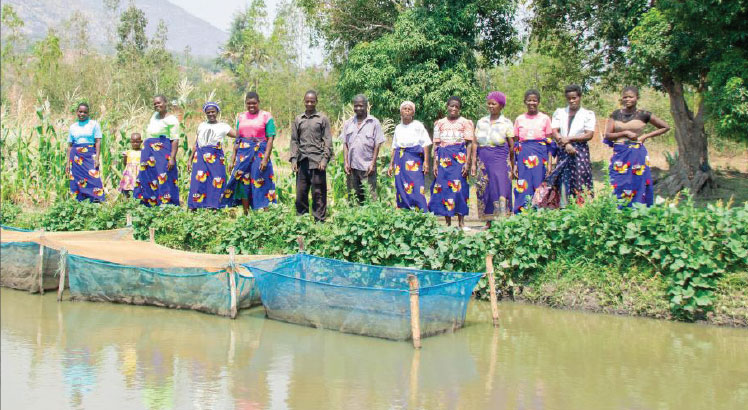Diversified diets for improved nutrition
Good nutrition is almost everything to Bertha Mawindo, especially for her two children aged six and three.
She always makes sure they are well-fed, be it with milk from her goats, vegetables from her backyard garden or other foods she may find in her rural locality.
Mawindo’s case is not exceptional in Mukwala Village in Phalombe, where she comes from. In the community, households are competing to construct kitchens with Chitetezo mbaula, a handmade cookstove that uses fewer pieces of firewood and emits less smoke than open fires.
They are also competing to improve sanitation by building modern toilets and bathrooms as well as to make backyard gardens where they grow vegetables which help them improve their nutrition.
Many households also raise and sell livestock such as rabbits, goats, and chickens.

Mawindo has five goats she received through a pass-on programme under the Scaling Up Stunting (SUN) project implemented by Hunger Project in Phalombe District with funding from KfW through Unicef Malawi in partnership with Malawi Government.
“We add the milk from the goats to the food we feed our children. We also sell the livestock and the vegetables to buy other foods to diversify our diets,” Mawindo says.
The SUN project in Phalombe aims to reduce stunting by following up nutrition interventions targeting pregnant and lactating women, children under five years old and adolescent girls, says The Hunger Project district nutrition coordinator Isaac Mkangama,.
He explains: “The key interventions do with behaviour change. For example, we focus on changing the behaviour of pregnant or lactating women so that they can change their eating habits and prepare their food well so that most of the nutrients are retained.
“So, the behaviour change is towards promoting those practices and seeking antenatal services for pregnant women. The message we give them is that once they realise they are pregnant, they should go to a hospital for antenatal care within the first three months of the pregnancy.”
Mkangama adds that some of the interventions the Hunger Project promotes are to ensure that communities have access to diversified foods through integrated homestead farming.
The organisation also encourages the establishment of backyard gardens and rearing small livestock such as goats and rabbits.
“If an area has a good water source, we also promote the establishment of fish ponds,” Mkangama says.
In Phalombe, The Hunger Project supports four groups with fish farming.
“Fish is an excellent source of protein, so we have trained communities on how they can prepare some foods from fish, especially for complementary feeding. They can make fish powder which they can add to porridge for their children,” Mkangama says.
Just as communities in Mukwala are determined to improve their nutrition, the Domazi Fish Club in Nachamba Village is just as focused on achieving good nutrition and financial independence through raising fish and cultivating vegetables.
The club of 11 women and four men was established in 2007 to enable its members to achieve self-sufficiency.
“We started this club to empower ourselves economically as well as to improve our nutrition,” says Rose Grey, a club member.
Though the club was established in 2007, Grey says it lost focus along the way and only found its footing in 2018 when members regrouped and started all over again.
The club harvested 107 kilogrammes (kg) of fish in 2021 and 130kg this year.
Club secretaryChancy Lihaka says they reinvested the proceeds into its two fish ponds.
The marginal increase in the harvest might put off some, but Grey is optimistic about the club’s future. The club also grows vegetables for sale, has a bank account and an active savings and loan scheme, all of which feed Grey’s optimism: “Our vision is that each of us should own an iron-roofed house by 2030.”





